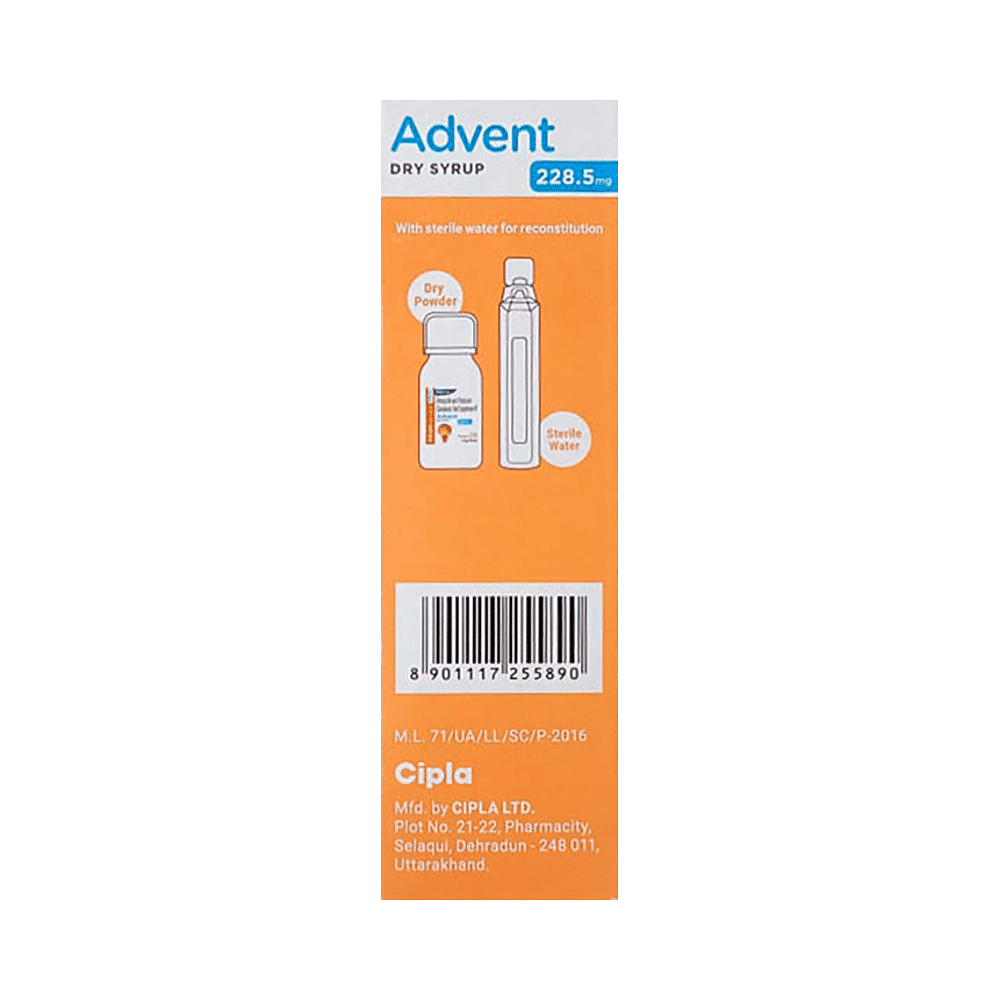
Zypclav Dry Syrup
Manufacturer
Apa Pharmaceuticals
Salt Composition
Amoxycillin (200mg/5ml) + Clavulanic Acid (28.5mg/5ml)
Key Information
Short Description
Zypclav Dry Syrup is an antibiotic medicine that helps treat bacterial infections of the ear, nose, throat, chest, lungs, teeth, skin, and urinary tract.
Dosage Form
Dry Syrup
Introduction
Zypclav Dry Syrup is an antibiotic medicine that helps treat bacterial infections of the ear, nose, throat, chest, lungs, teeth, skin, and urinary tract. It is capable of killing bacteria that have become resistant to other therapies and thus also helps treat tuberculosis that is resistant to other treatments.
Directions for Use
Your child must complete the entire course of antibiotics. Stopping too soon may cause the bacteria to multiply again or cause another infection.
How it works
Zypclav Dry Syrup is an antibiotic. It has two active agents amoxycillin and clavulanic acid. Amoxycillin works by preventing the formation of the bacterial protective covering (cell wall) essential for the survival of the bacteria. Whereas clavulanic acid serves a special purpose of inhibiting an enzyme (beta-lactamase) that is produced by resistant bacteria. This makes the combination of amoxycillin and clavulanic acid an effective line of treatment for many types of infections.
Quick Tips
Your child must complete the entire course of antibiotics. Stopping too soon may cause the bacteria to multiply again or cause another infection. Encourage your child to drink plenty of water in case diarrhea develops as a side effect. Never give Zypclav Dry Syrup until and unless prescribed by the doctor. Do not give Zypclav Dry Syrup to treat common cold and flu-like symptoms caused by viruses. Check ‘expiry’ before giving Zypclav Dry Syrup to your child. Immediately discard all the expired medicines.
Related Medicines

Advent 228.5mg Dry Syrup Tangy Orange

Ticmoxy BD Dry Syrup

Clavomost Dry Syrup

Clanex Dry Syrup

Elmoclav Dry Syrup

Moxineo Dry Syrup

Cimoxy Clav Dry Syrup

Pelmox CV Dry Syrup

Auxgo Dry Syrup

Alonzaclav Dry Syrup
Frequently asked questions
Can other medicines be given at the same time as Zypclav Dry Syrup?
Zypclav Dry Syrup may interact with other medications or substances. Please inform your child's doctor about all other medications your child is taking before starting Zypclav Dry Syrup. It is crucial to consult your child's doctor before administering any medication to your child.
Can I get my child vaccinated while on treatment with Zypclav Dry Syrup?
Antibiotics typically do not interfere with the ingredients in vaccines or cause a negative reaction in children who have recently been vaccinated. However, it is recommended to delay vaccination until your child's illness has been fully resolved. Once your child feels better, the vaccine can be administered.
Which lab tests may my child undergo while taking Zypclav Dry Syrup on a long-term basis?
Periodically, the doctor might order kidney and liver function tests during long-term therapy with Zypclav Dry Syrup to monitor your child's condition.
Can I give a higher than the recommended dose of Zypclav Dry Syrup to my child?
Giving a dosage higher than prescribed can increase the risk of adverse effects. If your child experiences worsening symptoms, please consult with their doctor for re-evaluation.
Can I stop giving Zypclav Dry Syrup to my child when the symptoms are relieved?
No, do not discontinue Zypclav Dry Syrup unless the entire course of treatment is complete. Even if your child feels better, symptoms might improve before the infection is fully eradicated. Therefore, continue the medication until it is finished as there could be ongoing benefits.
Can the use of Zypclav Dry Syrup cause diarrhea?
Yes, Zypclav Dry Syrup can cause diarrhea. This is because it kills harmful bacteria. Additionally, it may disrupt the healthy bacteria in your child's stomach, leading to diarrhea. Encourage your child to drink plenty of fluids if they experience diarrhea. Consult with your doctor if diarrhea persists and you notice signs of dehydration such as decreased urination, dark-colored and strong-smelling urine.
Do all viral common colds result in secondary bacterial infection?
While most common colds don't lead to a secondary bacterial infection. Antibiotics should only be prescribed by a doctor after consultation if there is an evident need for treatment.
The mucus coming out of my child’s nose is yellow-green. Is it a sign of a bacterial infection?
Yellow or green mucus in the nose does not necessarily indicate a bacterial infection. It's common for mucus to change color and thicken during a common cold. These symptoms typically last between 7 and 10 days.
Is there any sign which shows that my child needs immediate medical attention?
Call your child's doctor immediately if your child experiences serious allergic reactions (difficulty breathing, skin rashes), gastrointestinal infections (diarrhea), or liver damage (weakness, pallor, vomiting). While rare, these side effects are significant and require professional care.


